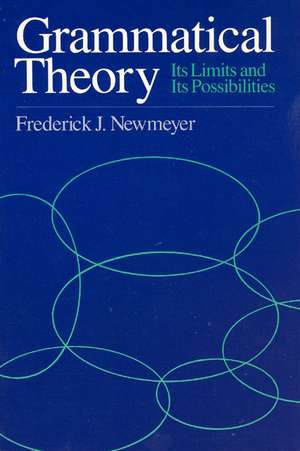Grammatical Theory: Its Limits and Its Possibilities
Autor Frederick J. Newmeyeren Limba Engleză Paperback – 31 aug 1983
Newmeyer persuasively defends the controversial theory of transformational generative grammar. Grammatical Theory is for every linguist, philosopher, or psychologist who is skeptical of generative grammar and wants to learn more about it.
Newmeyer's formidable scholarship raises the level of debate on transformational generative grammar. He stresses the central importance of an autonomous formal grammar, discusses the limitations of "discourse-based" approaches to syntax, cites support for generativist theory in recent research, and clarifies misunderstood concepts associated with generative grammar.
Newmeyer's formidable scholarship raises the level of debate on transformational generative grammar. He stresses the central importance of an autonomous formal grammar, discusses the limitations of "discourse-based" approaches to syntax, cites support for generativist theory in recent research, and clarifies misunderstood concepts associated with generative grammar.
Preț: 145.36 lei
Preț vechi: 183.27 lei
-21% Nou
Puncte Express: 218
Preț estimativ în valută:
27.82€ • 28.88$ • 23.20£
27.82€ • 28.88$ • 23.20£
Carte indisponibilă temporar
Doresc să fiu notificat când acest titlu va fi disponibil:
Se trimite...
Preluare comenzi: 021 569.72.76
Specificații
ISBN-13: 9780226577197
ISBN-10: 0226577198
Pagini: 201
Dimensiuni: 152 x 229 x 10 mm
Greutate: 0.23 kg
Ediția:Revised
Editura: University of Chicago Press
Colecția University of Chicago Press
ISBN-10: 0226577198
Pagini: 201
Dimensiuni: 152 x 229 x 10 mm
Greutate: 0.23 kg
Ediția:Revised
Editura: University of Chicago Press
Colecția University of Chicago Press
Notă biografică
Frederick J. Newmeyer is professor of linguistics at the University of Washington, Seattle.
Cuprins
Preface
1. The Generativist Approach to Linguistic Analysis
1.1. Introduction
1.2. On the Autonomy of Grammar and the Modular Conception of Language
1.3. Some Evidence for the Autonomy of Formal Grammar
1.3.1. Grammatical Evidence
1.3.2. Evidence from Language Acquisition
1.3.3. Neurological Evidence
1.4. Some Modular Accounts of Linguistic Phenomena
1.4.1. Multiply Center-Embedded Constructions
1.4.2. Tag Questions
1.4.3. Indirect Speech Acts
1.4.4. The Interpretation of Anaphoric Elements
1.5. Some Troublesome Concepts
1.5.1. Competence and Performance
1.5.2. Linguistic Universals
1.5.3. Simplicity and Evaluation
1.5.4. Psychological Reality
2. The Data Base of Grammatical Theory
2.1. The Value of Introspective Data
2.2. Conflicting Analyses, Not Conflicting Judgments
2.2.1. Grammaticality and Acceptability
2.2.2. Unclear Cases: Letting the Grammar Decide
2.2.3. The Problem of Context
2.2.4. Some Alleged Data Disagreements
2.3. Introspective and Nonintrospective Data
2.3.1. On Investigating Acceptability Experimentally
2.3.2. The Studies "Disconfirming" Introspective Data
2.3.3. The Validity Problem
2.4. Is Grammatical Theory English-Oriented?
3. Grammatical Theory and Language Variation
3.1. Introduction
3.2. On the "Ideal Speaker-Listener"
3.3. Optional Rules and Free Variation
3.4. On Variable Rules
3.5. Some Contributions of Grammatical Theory to the Understanding of Variation
3.5.1. Pidgins and Creoles
3.5.2. Casual Speech Phenomenon
3.5.3. Dialect Differences
3.5.4. Speech Errors
3.5.5. Language Play
3.5.6. Bilingual Code Switching
4. Formal Grammar and Extragrammatical Principles
4.1. Introduction
4.2. Three Popular Beliefs about Language
4.2.1. First Belief: The Function of Language Is Communication
4.2.2. Second Belief: Grammatical Form Is Derivable from Extragrammatical Principles
4.2.3. Third Belief: Communicative Function Explains Linguistic Form
4.3. Two Discourse-Oriented Approaches to Grammar
4.3.1. Bolinger's Meaning and Form
4.3.2. Givón's On Understanding Grammar
5. The Applicability of Grammatical Theory
5.1. Introduction
5.2. Three Reasons for the Disillusionment with Generativist Theory
5.2.1. The Unrealistic Expectations of Many Applied Linguists
5.2.2. Unsuccessful Applications of the Theory
5.2.3. The Supposed Indifference of Generativists to Applied Concerns
5.3. Some Implications and Applications of Grammatical Theory
5.3.1. Second Language Learning
5.3.2. Natural Language Processing
5.3.3. Linguistics and Literature
5.3.4. Linguistics as the Core of a Science Curriculum
5.3.5. Grammatical Theory and Nonstandard Dialects
5.4. Conclusion
References
Name Index
Subject Index
1. The Generativist Approach to Linguistic Analysis
1.1. Introduction
1.2. On the Autonomy of Grammar and the Modular Conception of Language
1.3. Some Evidence for the Autonomy of Formal Grammar
1.3.1. Grammatical Evidence
1.3.2. Evidence from Language Acquisition
1.3.3. Neurological Evidence
1.4. Some Modular Accounts of Linguistic Phenomena
1.4.1. Multiply Center-Embedded Constructions
1.4.2. Tag Questions
1.4.3. Indirect Speech Acts
1.4.4. The Interpretation of Anaphoric Elements
1.5. Some Troublesome Concepts
1.5.1. Competence and Performance
1.5.2. Linguistic Universals
1.5.3. Simplicity and Evaluation
1.5.4. Psychological Reality
2. The Data Base of Grammatical Theory
2.1. The Value of Introspective Data
2.2. Conflicting Analyses, Not Conflicting Judgments
2.2.1. Grammaticality and Acceptability
2.2.2. Unclear Cases: Letting the Grammar Decide
2.2.3. The Problem of Context
2.2.4. Some Alleged Data Disagreements
2.3. Introspective and Nonintrospective Data
2.3.1. On Investigating Acceptability Experimentally
2.3.2. The Studies "Disconfirming" Introspective Data
2.3.3. The Validity Problem
2.4. Is Grammatical Theory English-Oriented?
3. Grammatical Theory and Language Variation
3.1. Introduction
3.2. On the "Ideal Speaker-Listener"
3.3. Optional Rules and Free Variation
3.4. On Variable Rules
3.5. Some Contributions of Grammatical Theory to the Understanding of Variation
3.5.1. Pidgins and Creoles
3.5.2. Casual Speech Phenomenon
3.5.3. Dialect Differences
3.5.4. Speech Errors
3.5.5. Language Play
3.5.6. Bilingual Code Switching
4. Formal Grammar and Extragrammatical Principles
4.1. Introduction
4.2. Three Popular Beliefs about Language
4.2.1. First Belief: The Function of Language Is Communication
4.2.2. Second Belief: Grammatical Form Is Derivable from Extragrammatical Principles
4.2.3. Third Belief: Communicative Function Explains Linguistic Form
4.3. Two Discourse-Oriented Approaches to Grammar
4.3.1. Bolinger's Meaning and Form
4.3.2. Givón's On Understanding Grammar
5. The Applicability of Grammatical Theory
5.1. Introduction
5.2. Three Reasons for the Disillusionment with Generativist Theory
5.2.1. The Unrealistic Expectations of Many Applied Linguists
5.2.2. Unsuccessful Applications of the Theory
5.2.3. The Supposed Indifference of Generativists to Applied Concerns
5.3. Some Implications and Applications of Grammatical Theory
5.3.1. Second Language Learning
5.3.2. Natural Language Processing
5.3.3. Linguistics and Literature
5.3.4. Linguistics as the Core of a Science Curriculum
5.3.5. Grammatical Theory and Nonstandard Dialects
5.4. Conclusion
References
Name Index
Subject Index
